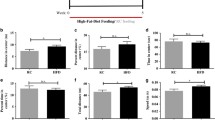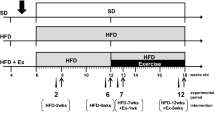Abstract
Rationale
The individual’s emotional state influences food intake in both humans and rodents. Moreover, specific cognitive processes regulating the salient aspects of food reward are also critical for ingestive behaviour. However, the molecular mechanisms underlying such influence remain unclear. Genetic mouse models thus are important tools in dissecting the molecular and pathophysiological processes which cause complex human diseases. Leptin, encoded by the ob gene, plays an important part in the energy homeostasis and is critical for the development of obesity.
Objectives
In these studies, we assess the impact of leptin on behaviours relevant to anxiety and appetitive learning.
Methods
Anxiety-related behaviour was assessed in the light dark box and two tests of hyponeophagia. Spatial learning and behavioural flexibility by re-learning was assessed in an appetitive Y-maze task.
Results
Leptin-deficient (ob/ob) mice displayed higher levels of anxiety-related behaviour in both anxiety tests. In the appetitive Y-maze task, leptin deficiency caused no deficit in learning or re-learning and acute restrained stress had no influence on the learning process.
Conclusions
These results emphasise that whilst leptin has previously been shown to modulate aversively motivated learning we found no difference between leptin-deficient mice and their controls in an appetitive learning task. Moreover, both groups showed behavioural flexibility under stressful conditions. On the other hand, leptin deficiency resulted in marked alterations in behaviours relevant to anxiety.






Similar content being viewed by others
References
Ahima RS, Flier JS (2000) Leptin. Annu Rev Physiol 62:413–437
Asakawa A, Inui A, Inui T, Katsuura G, Fujino MA, Kasuga M (2003) Leptin treatment ameliorates anxiety in ob/ob obese mice. J Diab Complications 17:105–107
Bannerman DM, Deacon RM, Offen S, Friswell J, Grubb M, Rawlins JN (2002) Double dissociation of function within the hippocampus: spatial memory and hyponeophagia. Behav Neurosci 116:884–901
Bannerman DM, Grubb M, Deacon RM, Yee BK, Feldon J, Rawlins JN (2003) Ventral hippocampal lesions affect anxiety but not spatial learning. Behav Brain Res 139:197–213
Barry D, Pietrzak RH, Petry NM (2008) Gender differences in associations between body mass index and DSM-IV mood and anxiety disorders: results from the National Epidemiologic Survey on Alcohol and Related Conditions. Ann Epidemiol 18:458–466
Bodnoff SR, Suranyi-Cadotte BE, Quirion R, Meaney MJ (1989) Role of the central benzodiazepine receptor system in behavioral habituation to novelty. Behav Neurosci 103:209–212
Campfield LA, Smith FJ, Guisez Y, Devos R, Burn P (1995) Recombinant mouse OB protein: evidence for a peripheral signal linking adiposity and central neural networks. Science 269:546–549
Clément K, Vaisse C, Lahlou N, Cabrolk S, Pelloux V, Cassuto D, Gourmelenk M, Dina C, Chambaz J, Lacorte J, Basdevant A, Bougnères P, Lebouck Y, Froguel P, Guy-Grand B (1998) A mutation in the human leptin receptor gene causes obesity and pituitary dysfunction. Nature 392(6674):398–401
Conrad CD, Jackson JL, Wieczorek L, Baran SE, Harman JS, Wright RL, Korol DL (2004) Acute stress impairs spatial memory in male but not female rats: influence of estrous cycle. Pharmacol Biochem Behav 78:569–579
Crawley J, Goodwin FK (1980) Preliminary report of a simple animal behavior model for the anxiolytic effects of benzodiazepines. Pharmacol Biochem Behav 13:167–170
Cryan JF, Holmes A (2005) The ascent of mouse: advances in modelling human depression and anxiety. Nat Rev Drug Discov 4:775–790
Cryan JF, Kelly PH, Neijt HC, Sansig G, Flor PJ, van Der Putten H (2003) Antidepressant and anxiolytic-like effects in mice lacking the group III metabotropic glutamate receptor mGluR7. Eur J Neurosci 17:2409–2417
Dallman MF (2010) Stress-induced obesity and the emotional nervous system. Trends Endocrinol Metab 21(3):159–165
Deacon RM, Rawlins JN (2005) Hippocampal lesions, species-typical behaviours and anxiety in mice. Behav Brain Res 156:241–249
Deacon RM, Bannerman DM, Kirby BP, Croucher A, Rawlins JN (2002) Effects of cytotoxic hippocampal lesions in mice on a cognitive test battery. Behav Brain Res 133:57–68
Deacon RM, Thomas CL, Rawlins JN, Morley BJ (2007) A comparison of the behavior of C57BL/6 and C57BL/10 mice. Behav Brain Res 179:239–247
Dulawa SC, Hen R (2005) Recent advances in animal models of chronic antidepressant effects: the novelty-induced hypophagia test. Neurosci Biobehav Rev 29:771–783
Everitt BJ, Cardinal RN, Parkinson JA, Robbins TW (2003) Appetitive behavior: impact of amygdala-dependent mechanisms of emotional learning. Ann N Y Acad Sci 985:233–250
Farooqi IS, Keogh JM, Kamath S, Jones S, Gibson WT, Trussell R, Jebb SA, Lip GY, O’Rahilly S (2001) Partial leptin deficiency and human adiposity. Nature 414:34–35
Farr SA, Banks WA, Morley JE (2006) Effects of leptin on memory processing. Peptides 27:1420–1425
Friedman JM (2000) Obesity in the new millennium. Nature 404:632–634
Friedman JM, Halaas JL (1998) Leptin and the regulation of body weight in mammals. Nature 395:763–770
Fulton S, Woodside B, Shizgal P (2000) Modulation of brain reward circuitry by leptin. Science 287:125–128
Fulton S, Pissios P, Manchon RP, Stiles L, Frank L, Pothos EN, Maratos-Flier E, Flier JS (2006) Leptin regulation of the mesoaccumbens dopamine pathway. Neuron 51:811–822
Garza JC, Guo M, Zhang W, Lu XY (2008) Leptin increases adult hippocampal neurogenesis in vivo and in vitro. J Biol Chem 283:18238–18247
Ghiglieri O, Gambarana C, Scheggi S, Tagliamonte A, Willner P, De Montis MG (1997) Palatable food induces an appetitive behaviour in satiated rats which can be inhibited by chronic stress. Behav Pharmacol 8:619–628
Goldbacher EM, Matthews KA (2007) Are psychological characteristics related to risk of the metabolic syndrome? A review of the literature. Ann Behav Med 34:240–252
Halaas JL, Gajiwala KS, Maffei M, Cohen SL, Chait BT, Rabinowitz D, Lallone RL, Burley SK, Friedman JM (1995) Weight-reducing effects of the plasma protein encoded by the obese gene. Science 269:543–546
Holmes A, Yang RJ, Murphy DL, Crawley JN (2002) Evaluation of antidepressant-related behavioral responses in mice lacking the serotonin transporter. Neuropsychopharmacology 27:914–923
Ingalls AM, Dickie MM, Snell GD (1950) Obese, a new mutation in the house mouse. J Hered 41:317–318
Jacobson LH, Bettler B, Kaupmann K, Cryan JF (2007) Behavioral evaluation of mice deficient in GABA(B(1)) receptor isoforms in tests of unconditioned anxiety. Psychopharmacology (Berl) 190:541–553
Krude H, Biebermann H, Luck W, Horn R, Brabant G, Grüters A (1998) Severe early-onset obesity, adrenal insufficiency and red hair pigmentation caused by POMC mutations in humans. Nat Genet 19:155–157
Laposky AD, Shelton J, Bass J, Dugovic C, Perrino N, Turek FW (2006) Altered sleep regulation in leptin-deficient mice. Am J Physiol Regul Integr Comp Physiol 290:R894–R903
Li XL, Aou S, Oomura Y, Hori N, Fukunaga K, Hori T (2002) Impairment of long-term potentiation and spatial memory in leptin receptor-deficient rodents. Neuroscience 113:607–615
Liu J, Garza JC, Bronner J, Kim CS, Zhang W, Lu XY (2010) Acute administration of leptin produces anxiolytic-like effects: a comparison with fluoxetine. Psychopharmacology (Berl) 207(4):535–545
Maffei M, Halaas JL, Ravussin E, Pratley RE, Lee GH, Zhang Y, Fei H, Kim S, Lallone RL, Ranganathan S et al (1995) Leptin levels in human and rodent: measurement of plasma leptin and ob RNA in obese and weight-reduced subjects. Nat Med 1:1155–1161
McElroy SL, Kotwal R, Malhotra S, Nelson EB, Keck PE, Nemeroff CB (2004) Are mood disorders and obesity related? A review for the mental health professional. J Clin Psychiatry 65:634–651
Merali Z, Levac C, Anisman H (2003) Validation of a simple, ethologically relevant paradigm for assessing anxiety in mice. Biol Psychiatry 54:552–565
Mombereau C, Kaupmann K, Froestl W, Sansig G, van Der Putten H, Cryan JF (2004) Genetic and pharmacological evidence of a role for GABA(B) receptors in the modulation of anxiety- and antidepressant-like behavior. Neuropsychopharmacology 29:1050–1062
Montague CT, Farooqi IS, Whitehead JP, Soos MA, Rau H, Wareham NJ, Sewter CP, Digby JE, Mohammed SN, Hurst JA, Cheetham CH, Earley AR, Barnett AH, Prins JB, O’Rahilly S (1997) Congenital leptin deficiency is associated with severe early-onset obesity in humans. Nature 387:903–908
Morrison CD (2009) Leptin signaling in brain: a link between nutrition and cognition? Biochim Biophys Acta 1792:401–408
O’Malley D, MacDonald N, Mizielinska S, Connolly CN, Irving AJ, Harvey J (2007) Leptin promotes rapid dynamic changes in hippocampal dendritic morphology. Mol Cell Neurosci 35:559–572
Ohta R, Shigemura N, Sasamoto K, Koyano K, Ninomiya Y (2003) Conditioned taste aversion learning in leptin-receptor-deficient db/db mice. Neurobiol Learn Mem 80:105–112
Oomura Y, Hori N, Shiraishi T, Fukunaga K, Takeda H, Tsuji M, Matsumiya T, Ishibashi M, Aou S, Li XL, Kohno D, Uramura K, Sougawa H, Yada T, Wayner MJ, Sasaki K (2006) Leptin facilitates learning and memory performance and enhances hippocampal CA1 long-term potentiation and CaMK II phosphorylation in rats. Peptides 27:2738–2749
Oomura Y, Aou S, Fukunaga K (2010) Prandial increase of leptin in the brain activates spatial learning and memory. Pathophysiology 17(2):119–127
Pallister E, Waller G (2008) Anxiety in the eating disorders: understanding the overlap. Clin Psychol Rev 28:366–386
Paulus K, Schulz C, Lehnert H (2005) Central nervous effects of leptin and insulin on hippocampal leptin and insulin receptor expression following a learning task in Wistar rats. Neuropsychobiology 51:100–106
Pelleymounter MA, Cullen MJ, Baker MB, Hecht R, Winters D, Boone T, Collins F (1995) Effects of the obese gene product on body weight regulation in ob/ob mice. Science 269(5223):540–543
Reisel D, Bannerman DM, Schmitt WB, Deacon RM, Flint J, Borchardt T, Seeburg PH, Rawlins JN (2002) Spatial memory dissociations in mice lacking GluR1. Nat Neurosci 5:868–873
Scott KM, McGee MA, Wells JE, Oakley Browne MA (2008) Obesity and mental disorders in the adult general population. J Psychosom Res 64:97–105
Swinbourne JM, Touyz SW (2007) The co-morbidity of eating disorders and anxiety disorders: a review. Eur Eat Disord Rev 15:253–274
Vaisse C, Clement K, Guy-Grand B, Froguel P (1998) A frameshift mutation in human MC4R is associated with a dominant form of obesity. Nat Genet 20:113–114
Vieweg WV, Levy JR, Fredrickson SK, Chipkin SR, Beatty-Brooks M, Fernandez A, Hasnain M, Pandurangi AK (2008) Psychotropic drug considerations in depressed patients with metabolic disturbances. Am J Med 121:647–655
Winocur G, Greenwood CE, Piroli GG, Grillo CA, Reznikov LR, Reagan LP, McEwen BS (2005) Memory impairment in obese Zucker rats: an investigation of cognitive function in an animal model of insulin resistance and obesity. Behav Neurosci 119(5):1389–1395
Wright RL, Conrad CD (2008) Enriched environment prevents chronic stress-induced spatial learning and memory deficits. Behav Brain Res 187:41–47
Yeo GS, Farooqi IS, Aminian S, Halsall DJ, Stanhope RG, O’Rahilly S (1998) A frameshift mutation in MC4R associated with dominantly inherited human obesity. Nat Genet 20:111–112
Zhang Y, Proenca R, Maffei M, Barone M, Leopold L, Friedman JM (1994) Positional cloning of the mouse obese gene and its human homologue. Nature 372:425–432
Zheng CJ, Han LY, Yap CW, Ji ZL, Cao ZW, Chen YZ (2006) Therapeutic targets: progress of their exploration and investigation of their characteristics. Pharmacol Rev 58:259–279
Acknowledgements
The work described herein was supported by Enterprise Ireland under grant number CC20080001. JFC and TGD are also supported in part by Science Foundation Ireland in the form of a centre grant (Alimentary Pharmabiotic Centre). The centre is also funded by GlaxoSmithKline. JFC is funded by European Community’s Seventh Framework Programme, grant number: FP7/2007-2013, Grant Agreement 201714.
Author information
Authors and Affiliations
Corresponding author
Rights and permissions
About this article
Cite this article
Finger, B.C., Dinan, T.G. & Cryan, J.F. Leptin-deficient mice retain normal appetitive spatial learning yet exhibit marked increases in anxiety-related behaviours. Psychopharmacology 210, 559–568 (2010). https://doi.org/10.1007/s00213-010-1858-z
Received:
Accepted:
Published:
Issue Date:
DOI: https://doi.org/10.1007/s00213-010-1858-z




